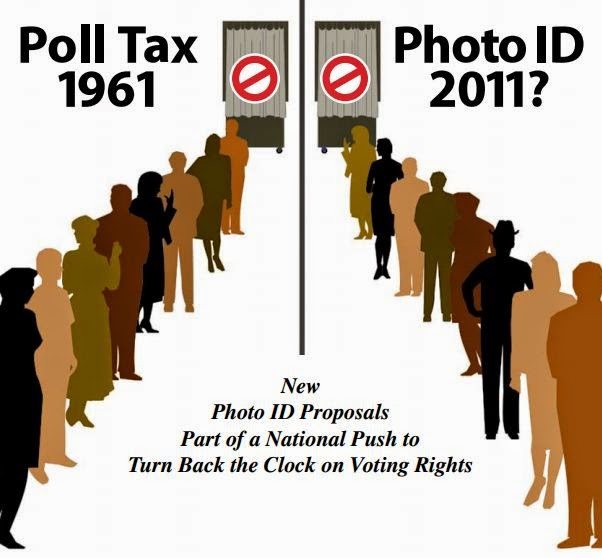
Texas Stops Minority Voters With ‘Poll Tax’ Law
October 21, 2014
Unbiased Political News
On Saturday, the U.S. Supreme Court ruled that a controversial new GOP-led law requiring specific forms of identification to vote in the State of Texas is valid and can be implemented in time for the November midterm election.
Last week, a federal judge struck down the law, acknowledging that roughly 600,000 voters, many of them black or Latino, could be turned away at the polls because they lack acceptable identification. However, proponents of the law claimed that requiring specific forms of identification would curtail fraud, despite the fact no pattern of fraud exists in the state.
 With early voting already underway as of yesterday, the new Texas law set 7 forms of approved ID as acceptable. Oddly that list includes concealed handgun licenses but not college student IDs, which is widely accepted in other states with similar measures.
With early voting already underway as of yesterday, the new Texas law set 7 forms of approved ID as acceptable. Oddly that list includes concealed handgun licenses but not college student IDs, which is widely accepted in other states with similar measures.
A majority of the justices rejected an emergency request from the Justice Department and civil rights groups to prevent the state from mandating certain forms of photo identification in order for voters to cast ballots. Justices Ruth Bader Ginsburg, Sonia Sotomayor and Elena Kagan dissented, saying they would have left the district court decision in place.
“The greatest threat to public confidence in elections in this case is the prospect of enforcing a purposefully discriminatory law, one that likely imposes an unconstitutional poll tax and risks denying the right to vote to hundreds of thousands of eligible voters,” Ginsburg wrote in dissent.
Unbiased Political News
Interestingly, the Supreme Court intervened in 3 other recent disputes regarding Republican-led restrictions on voting access. In Wisconsin, the justices blocked a voter ID law from being used in November. In North Carolina and Ohio, the justices allowed limits on same-day registration, early voting and provisional ballots to take or remain in effect. However, they considered the Texas case differently.
Ginsburg said the Texas case was different from the clashes in North Carolina and Ohio because a federal judge held a full trial on the Texas election procedures and developed “an extensive record” finding the process discriminated against ballot access.
A 143-page opinion from U.S. District Judge Nelva Gonzales Ramos called the law an “unconstitutional burden on the right to vote” and the equivalent of a poll tax. Her opinion argued that the Republican-led Texas Legislature purposely discriminated against minority voters in Texas, so as to sway election results in their favor.
Republican lawmakers in Texas and elsewhere claim voter ID laws are needed to reduce voter fraud. Democrats argue that such cases are extremely rare and that voter ID measures are thinly veiled attempts to keep eligible black and Latino voters (many of whom support Democratic candidates) away from the polls.






